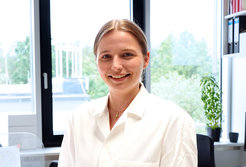Maren Nattermann Receives the VAAM Doctoral Prize
Dr Maren Nattermann, former doctoral student at the Max Planck Institute for Terrestrial Microbiology, has won the VAAM doctoral prize. The prize is awarded annually by the Association for General and Applied Microbiology (VAAM).

Maren Nattermann, who worked on her PhD in Professor Erb's research group, developed an artificial enzyme cascade that enables the energy-efficient conversion of formic acid (known as formate in its neutralised form) into fine chemicals. This represents a bio-based approach that can increase the energy efficiency and sustainability of raw material production.
To integrate the greenhouse gas CO2 into biotechnological production cascades, a major thermodynamic hurdle must be overcome: To use the low-energy CO2 as a carbon source, a separate energy source is required. Plants do this through photosynthesis using sunlight.
In man-made systems, sunlight can be replaced by electricity to electrocatalytically convert CO2 into intermediates such as formate. Although formate is well suited for bioproduction due to its good water solubility and lack of toxicity, it has been difficult to integrate into existing production processes because its chemical "upgrading " is too energy-intensive and therefore uneconomical.
Maren Nattermann succeeded in reducing the energy required to convert formate into formaldehyde and in developing an efficient conversion of formaldehyde into long-chain carbons. Using a short enzymatic cascade, she could demonstrate the production of fine chemicals from formate as the sole substrate in a cell-based production process, a first in the field. The advantage of the cascade is that its components can be used individually and can be applied both in living cells and in cell-free reactions.
Working on biocatalysts requires perseverance and creativity. Both qualities have paid off and have now been awarded with the VAAM PhD Award. Maren Nattermann had already won the Marburg Initiative for Bio- and Nanotechnology (MarBiNa) prize earlier this year. "I started my scientific career with my master's thesis with Tobias Erb. I was impressed by his research (and that of my former supervisor, Simon Burgener) and how much you can 'play' with enzyme functions if you turn the right screws. This fascination has stayed with me to this day, and now I even get to witness how my "home-made" small biocatalysts are incorporated into larger systems with real biotechnological potential. The VAAM PhD Award means a lot to me in this context and gives my research both drive and scope. Of course, one does not walk such a path alone and I would like to thank the many coworkers and collaborators that have supported and enabled my research".
In addition to her research, Maren Nattermann is also active in science communication. As part of MPI Marburg's "Meet a Scientist" format, she visits school students in the University of Marburg's photosynthesis laboratory. "Synthetic biology is a very young, particularly exciting and forward-looking field of research. We are delighted when the possibilities of this research become visible, as is the case with the VAAM PhD Award”.
VAAM represents approximately 3,500 microbiologically oriented scientists from research and industry. The spectrum of research ranges from bacteria, archaea and fungi in food and water to pathogens, genome analysis and the industrial use of microorganisms and their enzymes. This year's annual conference will be held from 2 to 5 June in Würzburg, Germany, together with the DGHM (German Society for Hygiene and Microbiology).












